Report: Motivation and Organisational Effectiveness at Junction Hotel
VerifiedAdded on 2023/01/18
|12
|2975
|34
Report
AI Summary
This report delves into the critical relationship between employee motivation and organisational effectiveness, specifically within the context of the Junction Hotel. It begins by defining motivation and exploring its different types, including intrinsic and extrinsic motivation, and highlights the impact of motivation on employee performance and the overall success of an organisation. The report then examines various theories of motivation, such as Maslow's Hierarchy of Needs and Herzberg's Dual Factor theory, providing a framework for understanding how to enhance employee motivation. Furthermore, it identifies key measures that Junction Hotel can implement to boost employee motivation, including effective leadership styles, rewards and recognition programs, and improvements to the organisational culture. The report concludes by emphasising the importance of motivation in driving organisational effectiveness and suggests practical strategies for the Junction Hotel to improve its performance.
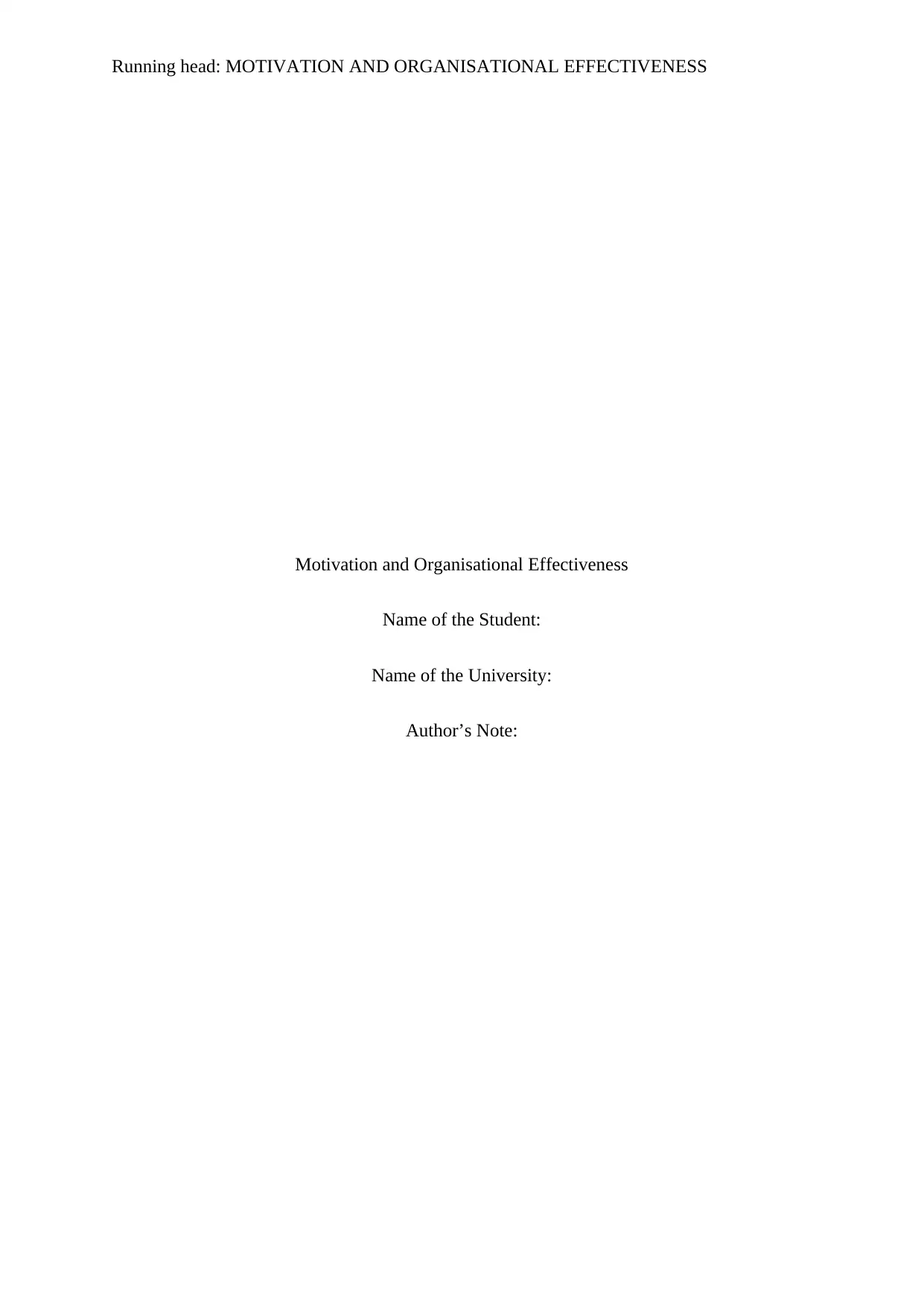
Running head: MOTIVATION AND ORGANISATIONAL EFFECTIVENESS
Motivation and Organisational Effectiveness
Name of the Student:
Name of the University:
Author’s Note:
Motivation and Organisational Effectiveness
Name of the Student:
Name of the University:
Author’s Note:
Paraphrase This Document
Need a fresh take? Get an instant paraphrase of this document with our AI Paraphraser
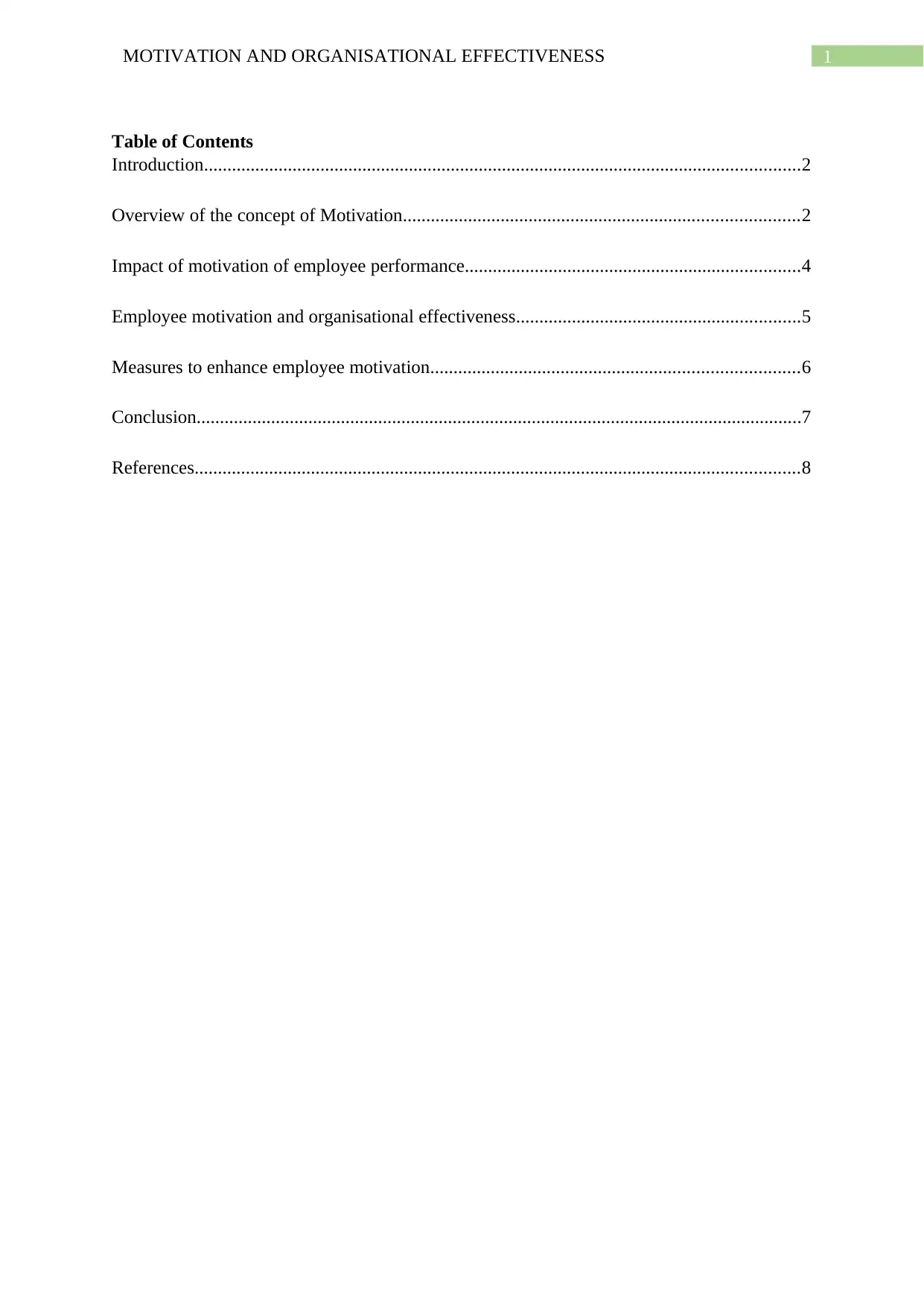
1MOTIVATION AND ORGANISATIONAL EFFECTIVENESS
Table of Contents
Introduction................................................................................................................................2
Overview of the concept of Motivation.....................................................................................2
Impact of motivation of employee performance........................................................................4
Employee motivation and organisational effectiveness.............................................................5
Measures to enhance employee motivation...............................................................................6
Conclusion..................................................................................................................................7
References..................................................................................................................................8
Table of Contents
Introduction................................................................................................................................2
Overview of the concept of Motivation.....................................................................................2
Impact of motivation of employee performance........................................................................4
Employee motivation and organisational effectiveness.............................................................5
Measures to enhance employee motivation...............................................................................6
Conclusion..................................................................................................................................7
References..................................................................................................................................8
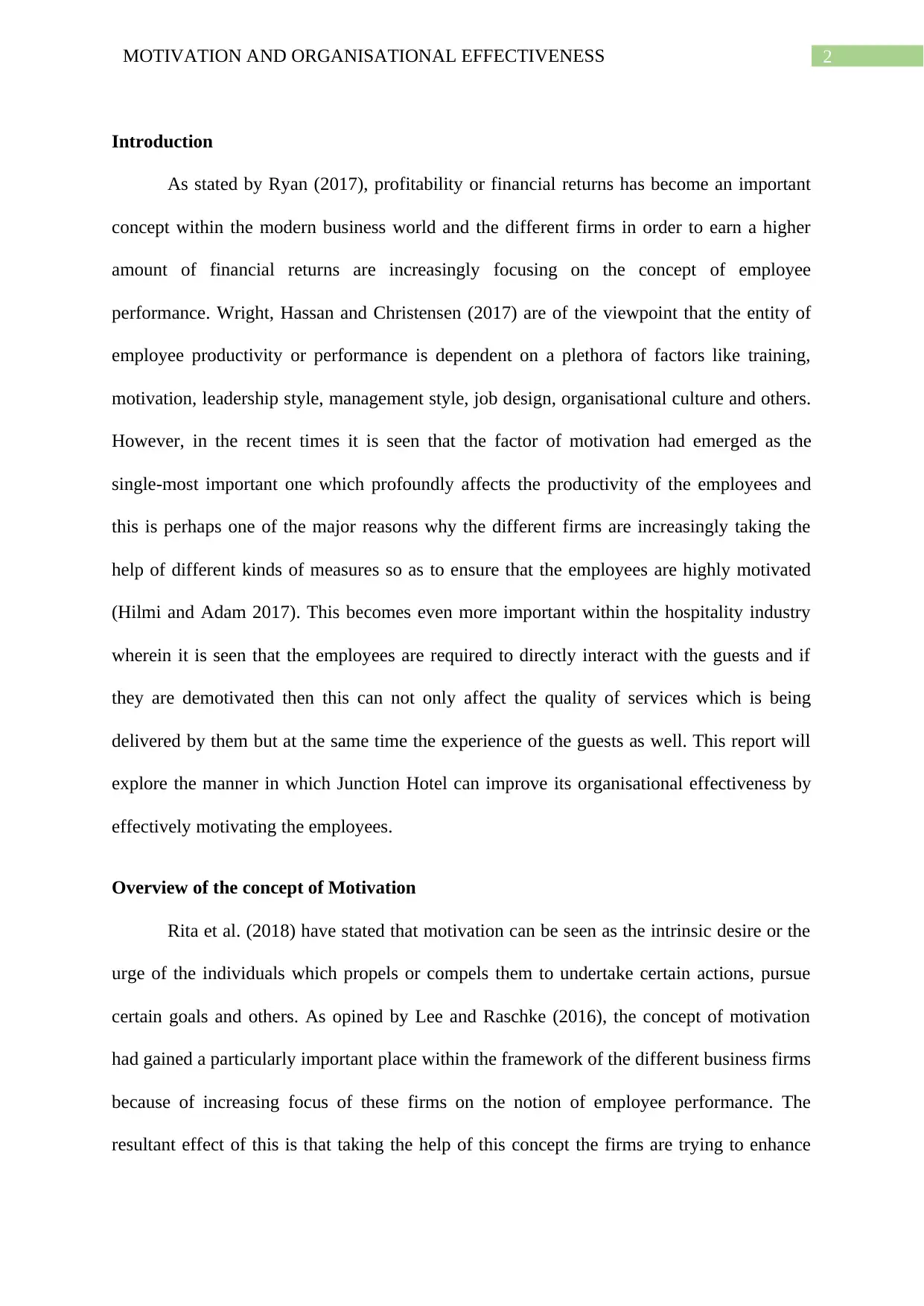
2MOTIVATION AND ORGANISATIONAL EFFECTIVENESS
Introduction
As stated by Ryan (2017), profitability or financial returns has become an important
concept within the modern business world and the different firms in order to earn a higher
amount of financial returns are increasingly focusing on the concept of employee
performance. Wright, Hassan and Christensen (2017) are of the viewpoint that the entity of
employee productivity or performance is dependent on a plethora of factors like training,
motivation, leadership style, management style, job design, organisational culture and others.
However, in the recent times it is seen that the factor of motivation had emerged as the
single-most important one which profoundly affects the productivity of the employees and
this is perhaps one of the major reasons why the different firms are increasingly taking the
help of different kinds of measures so as to ensure that the employees are highly motivated
(Hilmi and Adam 2017). This becomes even more important within the hospitality industry
wherein it is seen that the employees are required to directly interact with the guests and if
they are demotivated then this can not only affect the quality of services which is being
delivered by them but at the same time the experience of the guests as well. This report will
explore the manner in which Junction Hotel can improve its organisational effectiveness by
effectively motivating the employees.
Overview of the concept of Motivation
Rita et al. (2018) have stated that motivation can be seen as the intrinsic desire or the
urge of the individuals which propels or compels them to undertake certain actions, pursue
certain goals and others. As opined by Lee and Raschke (2016), the concept of motivation
had gained a particularly important place within the framework of the different business firms
because of increasing focus of these firms on the notion of employee performance. The
resultant effect of this is that taking the help of this concept the firms are trying to enhance
Introduction
As stated by Ryan (2017), profitability or financial returns has become an important
concept within the modern business world and the different firms in order to earn a higher
amount of financial returns are increasingly focusing on the concept of employee
performance. Wright, Hassan and Christensen (2017) are of the viewpoint that the entity of
employee productivity or performance is dependent on a plethora of factors like training,
motivation, leadership style, management style, job design, organisational culture and others.
However, in the recent times it is seen that the factor of motivation had emerged as the
single-most important one which profoundly affects the productivity of the employees and
this is perhaps one of the major reasons why the different firms are increasingly taking the
help of different kinds of measures so as to ensure that the employees are highly motivated
(Hilmi and Adam 2017). This becomes even more important within the hospitality industry
wherein it is seen that the employees are required to directly interact with the guests and if
they are demotivated then this can not only affect the quality of services which is being
delivered by them but at the same time the experience of the guests as well. This report will
explore the manner in which Junction Hotel can improve its organisational effectiveness by
effectively motivating the employees.
Overview of the concept of Motivation
Rita et al. (2018) have stated that motivation can be seen as the intrinsic desire or the
urge of the individuals which propels or compels them to undertake certain actions, pursue
certain goals and others. As opined by Lee and Raschke (2016), the concept of motivation
had gained a particularly important place within the framework of the different business firms
because of increasing focus of these firms on the notion of employee performance. The
resultant effect of this is that taking the help of this concept the firms are trying to enhance
⊘ This is a preview!⊘
Do you want full access?
Subscribe today to unlock all pages.

Trusted by 1+ million students worldwide
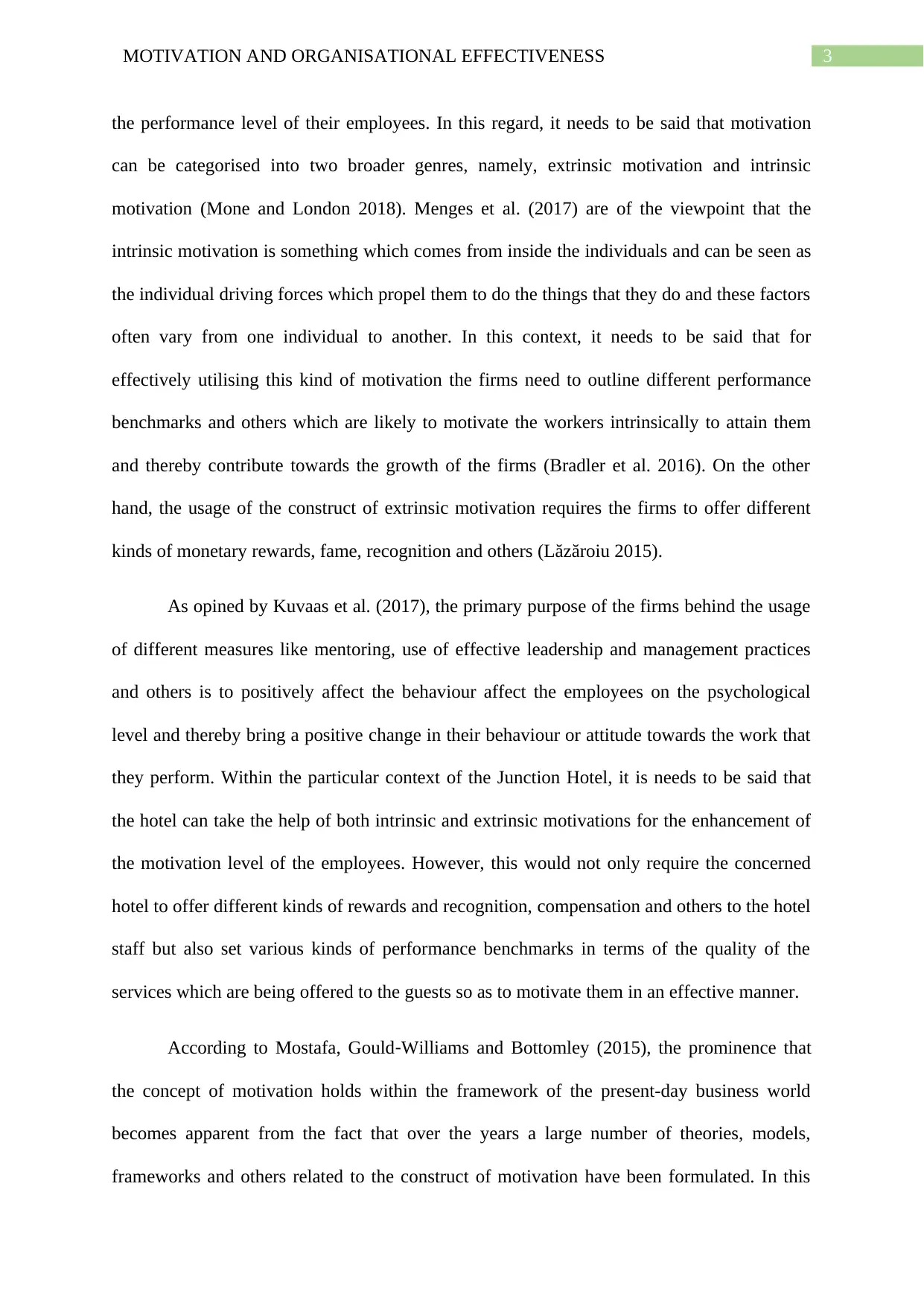
3MOTIVATION AND ORGANISATIONAL EFFECTIVENESS
the performance level of their employees. In this regard, it needs to be said that motivation
can be categorised into two broader genres, namely, extrinsic motivation and intrinsic
motivation (Mone and London 2018). Menges et al. (2017) are of the viewpoint that the
intrinsic motivation is something which comes from inside the individuals and can be seen as
the individual driving forces which propel them to do the things that they do and these factors
often vary from one individual to another. In this context, it needs to be said that for
effectively utilising this kind of motivation the firms need to outline different performance
benchmarks and others which are likely to motivate the workers intrinsically to attain them
and thereby contribute towards the growth of the firms (Bradler et al. 2016). On the other
hand, the usage of the construct of extrinsic motivation requires the firms to offer different
kinds of monetary rewards, fame, recognition and others (Lăzăroiu 2015).
As opined by Kuvaas et al. (2017), the primary purpose of the firms behind the usage
of different measures like mentoring, use of effective leadership and management practices
and others is to positively affect the behaviour affect the employees on the psychological
level and thereby bring a positive change in their behaviour or attitude towards the work that
they perform. Within the particular context of the Junction Hotel, it is needs to be said that
the hotel can take the help of both intrinsic and extrinsic motivations for the enhancement of
the motivation level of the employees. However, this would not only require the concerned
hotel to offer different kinds of rewards and recognition, compensation and others to the hotel
staff but also set various kinds of performance benchmarks in terms of the quality of the
services which are being offered to the guests so as to motivate them in an effective manner.
According to Mostafa, Gould‐Williams and Bottomley (2015), the prominence that
the concept of motivation holds within the framework of the present-day business world
becomes apparent from the fact that over the years a large number of theories, models,
frameworks and others related to the construct of motivation have been formulated. In this
the performance level of their employees. In this regard, it needs to be said that motivation
can be categorised into two broader genres, namely, extrinsic motivation and intrinsic
motivation (Mone and London 2018). Menges et al. (2017) are of the viewpoint that the
intrinsic motivation is something which comes from inside the individuals and can be seen as
the individual driving forces which propel them to do the things that they do and these factors
often vary from one individual to another. In this context, it needs to be said that for
effectively utilising this kind of motivation the firms need to outline different performance
benchmarks and others which are likely to motivate the workers intrinsically to attain them
and thereby contribute towards the growth of the firms (Bradler et al. 2016). On the other
hand, the usage of the construct of extrinsic motivation requires the firms to offer different
kinds of monetary rewards, fame, recognition and others (Lăzăroiu 2015).
As opined by Kuvaas et al. (2017), the primary purpose of the firms behind the usage
of different measures like mentoring, use of effective leadership and management practices
and others is to positively affect the behaviour affect the employees on the psychological
level and thereby bring a positive change in their behaviour or attitude towards the work that
they perform. Within the particular context of the Junction Hotel, it is needs to be said that
the hotel can take the help of both intrinsic and extrinsic motivations for the enhancement of
the motivation level of the employees. However, this would not only require the concerned
hotel to offer different kinds of rewards and recognition, compensation and others to the hotel
staff but also set various kinds of performance benchmarks in terms of the quality of the
services which are being offered to the guests so as to motivate them in an effective manner.
According to Mostafa, Gould‐Williams and Bottomley (2015), the prominence that
the concept of motivation holds within the framework of the present-day business world
becomes apparent from the fact that over the years a large number of theories, models,
frameworks and others related to the construct of motivation have been formulated. In this
Paraphrase This Document
Need a fresh take? Get an instant paraphrase of this document with our AI Paraphraser
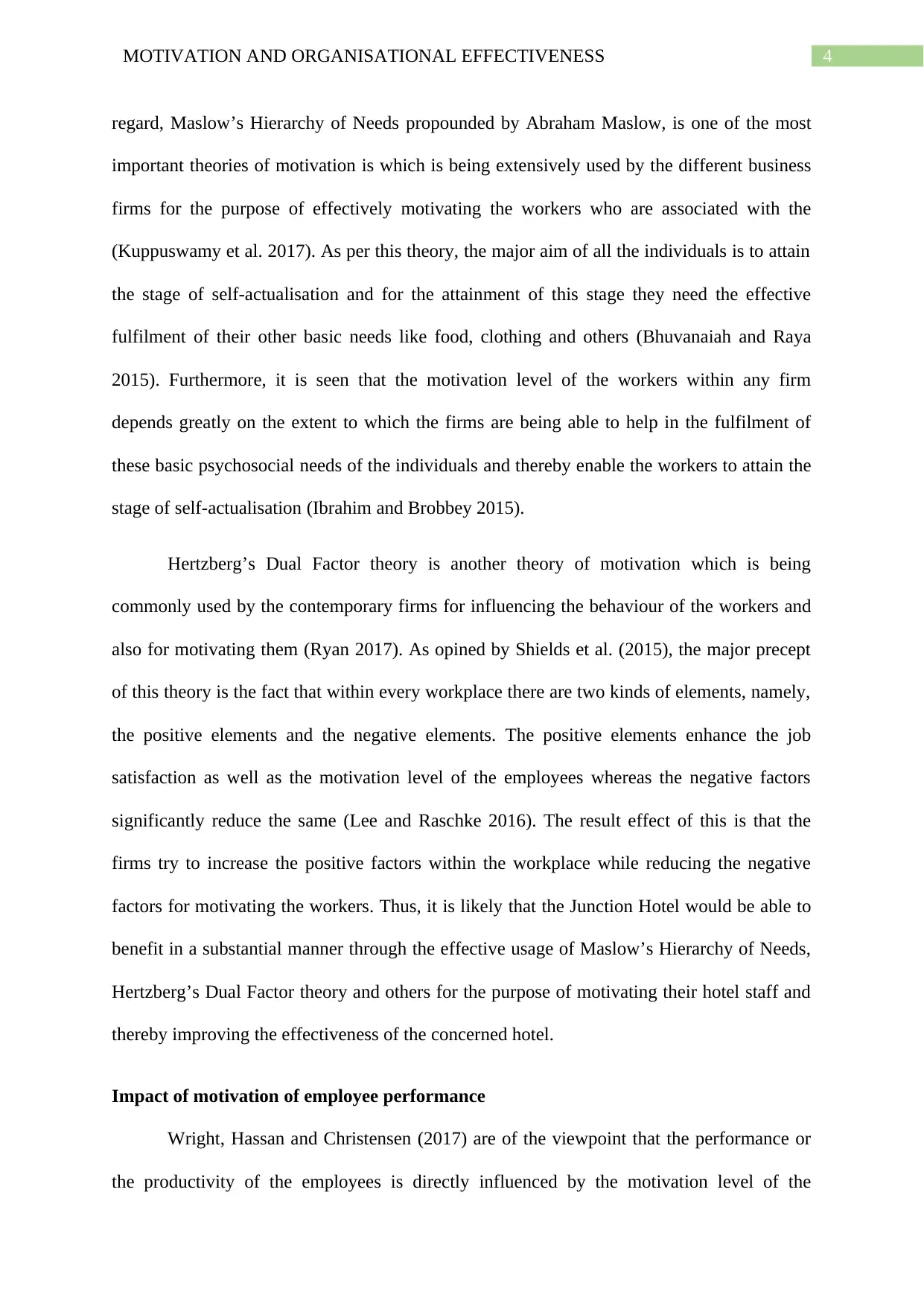
4MOTIVATION AND ORGANISATIONAL EFFECTIVENESS
regard, Maslow’s Hierarchy of Needs propounded by Abraham Maslow, is one of the most
important theories of motivation is which is being extensively used by the different business
firms for the purpose of effectively motivating the workers who are associated with the
(Kuppuswamy et al. 2017). As per this theory, the major aim of all the individuals is to attain
the stage of self-actualisation and for the attainment of this stage they need the effective
fulfilment of their other basic needs like food, clothing and others (Bhuvanaiah and Raya
2015). Furthermore, it is seen that the motivation level of the workers within any firm
depends greatly on the extent to which the firms are being able to help in the fulfilment of
these basic psychosocial needs of the individuals and thereby enable the workers to attain the
stage of self-actualisation (Ibrahim and Brobbey 2015).
Hertzberg’s Dual Factor theory is another theory of motivation which is being
commonly used by the contemporary firms for influencing the behaviour of the workers and
also for motivating them (Ryan 2017). As opined by Shields et al. (2015), the major precept
of this theory is the fact that within every workplace there are two kinds of elements, namely,
the positive elements and the negative elements. The positive elements enhance the job
satisfaction as well as the motivation level of the employees whereas the negative factors
significantly reduce the same (Lee and Raschke 2016). The result effect of this is that the
firms try to increase the positive factors within the workplace while reducing the negative
factors for motivating the workers. Thus, it is likely that the Junction Hotel would be able to
benefit in a substantial manner through the effective usage of Maslow’s Hierarchy of Needs,
Hertzberg’s Dual Factor theory and others for the purpose of motivating their hotel staff and
thereby improving the effectiveness of the concerned hotel.
Impact of motivation of employee performance
Wright, Hassan and Christensen (2017) are of the viewpoint that the performance or
the productivity of the employees is directly influenced by the motivation level of the
regard, Maslow’s Hierarchy of Needs propounded by Abraham Maslow, is one of the most
important theories of motivation is which is being extensively used by the different business
firms for the purpose of effectively motivating the workers who are associated with the
(Kuppuswamy et al. 2017). As per this theory, the major aim of all the individuals is to attain
the stage of self-actualisation and for the attainment of this stage they need the effective
fulfilment of their other basic needs like food, clothing and others (Bhuvanaiah and Raya
2015). Furthermore, it is seen that the motivation level of the workers within any firm
depends greatly on the extent to which the firms are being able to help in the fulfilment of
these basic psychosocial needs of the individuals and thereby enable the workers to attain the
stage of self-actualisation (Ibrahim and Brobbey 2015).
Hertzberg’s Dual Factor theory is another theory of motivation which is being
commonly used by the contemporary firms for influencing the behaviour of the workers and
also for motivating them (Ryan 2017). As opined by Shields et al. (2015), the major precept
of this theory is the fact that within every workplace there are two kinds of elements, namely,
the positive elements and the negative elements. The positive elements enhance the job
satisfaction as well as the motivation level of the employees whereas the negative factors
significantly reduce the same (Lee and Raschke 2016). The result effect of this is that the
firms try to increase the positive factors within the workplace while reducing the negative
factors for motivating the workers. Thus, it is likely that the Junction Hotel would be able to
benefit in a substantial manner through the effective usage of Maslow’s Hierarchy of Needs,
Hertzberg’s Dual Factor theory and others for the purpose of motivating their hotel staff and
thereby improving the effectiveness of the concerned hotel.
Impact of motivation of employee performance
Wright, Hassan and Christensen (2017) are of the viewpoint that the performance or
the productivity of the employees is directly influenced by the motivation level of the
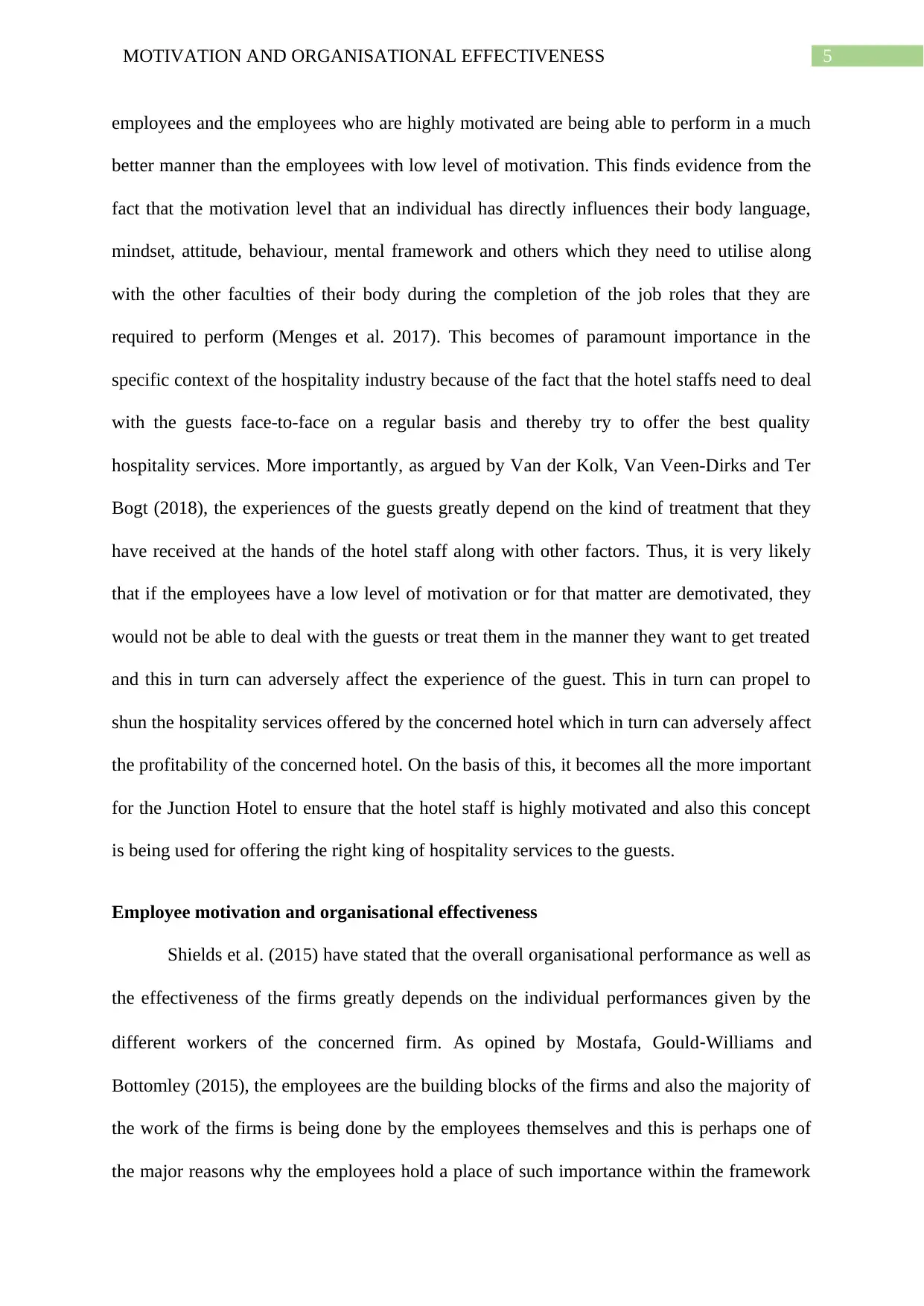
5MOTIVATION AND ORGANISATIONAL EFFECTIVENESS
employees and the employees who are highly motivated are being able to perform in a much
better manner than the employees with low level of motivation. This finds evidence from the
fact that the motivation level that an individual has directly influences their body language,
mindset, attitude, behaviour, mental framework and others which they need to utilise along
with the other faculties of their body during the completion of the job roles that they are
required to perform (Menges et al. 2017). This becomes of paramount importance in the
specific context of the hospitality industry because of the fact that the hotel staffs need to deal
with the guests face-to-face on a regular basis and thereby try to offer the best quality
hospitality services. More importantly, as argued by Van der Kolk, Van Veen-Dirks and Ter
Bogt (2018), the experiences of the guests greatly depend on the kind of treatment that they
have received at the hands of the hotel staff along with other factors. Thus, it is very likely
that if the employees have a low level of motivation or for that matter are demotivated, they
would not be able to deal with the guests or treat them in the manner they want to get treated
and this in turn can adversely affect the experience of the guest. This in turn can propel to
shun the hospitality services offered by the concerned hotel which in turn can adversely affect
the profitability of the concerned hotel. On the basis of this, it becomes all the more important
for the Junction Hotel to ensure that the hotel staff is highly motivated and also this concept
is being used for offering the right king of hospitality services to the guests.
Employee motivation and organisational effectiveness
Shields et al. (2015) have stated that the overall organisational performance as well as
the effectiveness of the firms greatly depends on the individual performances given by the
different workers of the concerned firm. As opined by Mostafa, Gould‐Williams and
Bottomley (2015), the employees are the building blocks of the firms and also the majority of
the work of the firms is being done by the employees themselves and this is perhaps one of
the major reasons why the employees hold a place of such importance within the framework
employees and the employees who are highly motivated are being able to perform in a much
better manner than the employees with low level of motivation. This finds evidence from the
fact that the motivation level that an individual has directly influences their body language,
mindset, attitude, behaviour, mental framework and others which they need to utilise along
with the other faculties of their body during the completion of the job roles that they are
required to perform (Menges et al. 2017). This becomes of paramount importance in the
specific context of the hospitality industry because of the fact that the hotel staffs need to deal
with the guests face-to-face on a regular basis and thereby try to offer the best quality
hospitality services. More importantly, as argued by Van der Kolk, Van Veen-Dirks and Ter
Bogt (2018), the experiences of the guests greatly depend on the kind of treatment that they
have received at the hands of the hotel staff along with other factors. Thus, it is very likely
that if the employees have a low level of motivation or for that matter are demotivated, they
would not be able to deal with the guests or treat them in the manner they want to get treated
and this in turn can adversely affect the experience of the guest. This in turn can propel to
shun the hospitality services offered by the concerned hotel which in turn can adversely affect
the profitability of the concerned hotel. On the basis of this, it becomes all the more important
for the Junction Hotel to ensure that the hotel staff is highly motivated and also this concept
is being used for offering the right king of hospitality services to the guests.
Employee motivation and organisational effectiveness
Shields et al. (2015) have stated that the overall organisational performance as well as
the effectiveness of the firms greatly depends on the individual performances given by the
different workers of the concerned firm. As opined by Mostafa, Gould‐Williams and
Bottomley (2015), the employees are the building blocks of the firms and also the majority of
the work of the firms is being done by the employees themselves and this is perhaps one of
the major reasons why the employees hold a place of such importance within the framework
⊘ This is a preview!⊘
Do you want full access?
Subscribe today to unlock all pages.

Trusted by 1+ million students worldwide
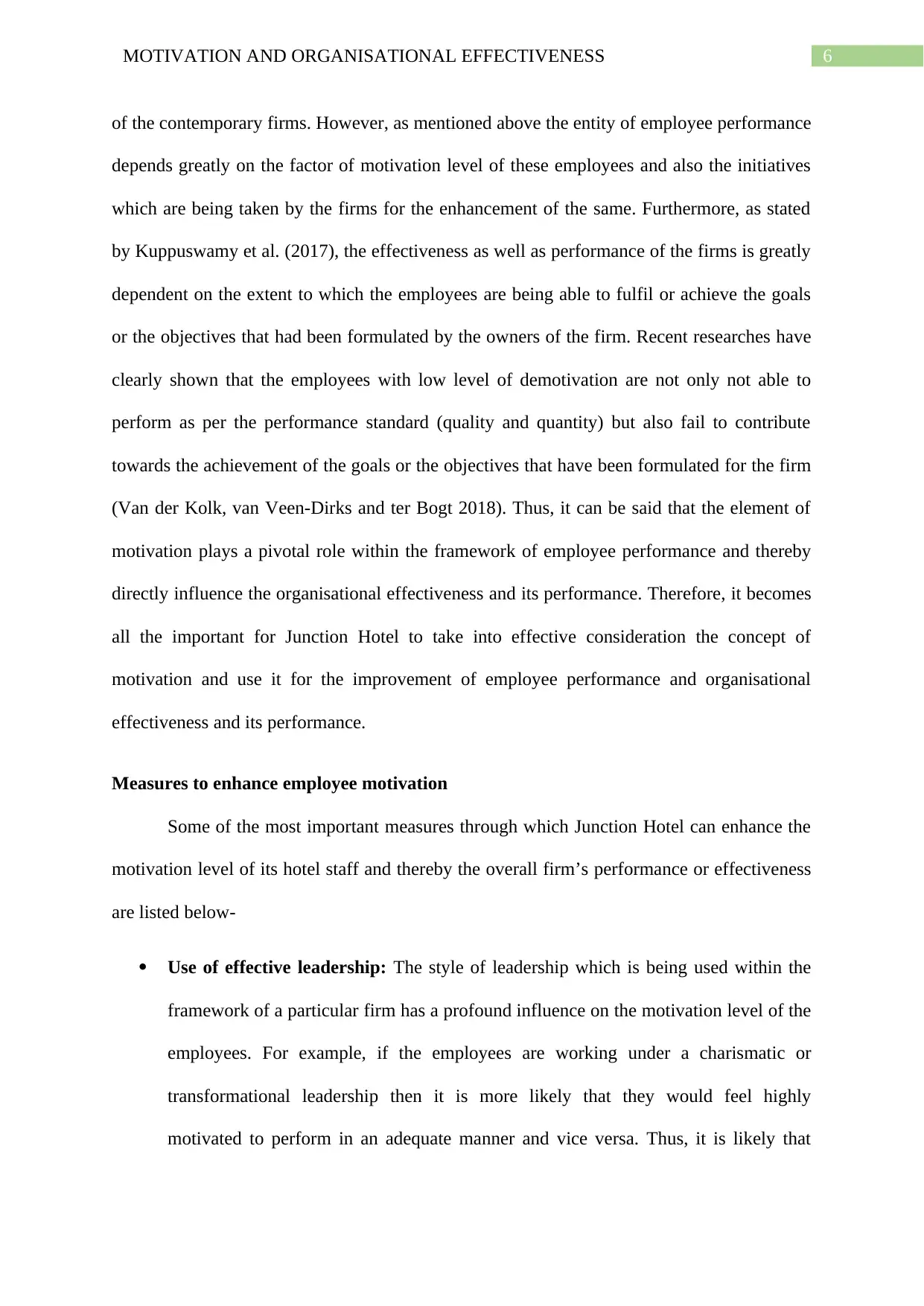
6MOTIVATION AND ORGANISATIONAL EFFECTIVENESS
of the contemporary firms. However, as mentioned above the entity of employee performance
depends greatly on the factor of motivation level of these employees and also the initiatives
which are being taken by the firms for the enhancement of the same. Furthermore, as stated
by Kuppuswamy et al. (2017), the effectiveness as well as performance of the firms is greatly
dependent on the extent to which the employees are being able to fulfil or achieve the goals
or the objectives that had been formulated by the owners of the firm. Recent researches have
clearly shown that the employees with low level of demotivation are not only not able to
perform as per the performance standard (quality and quantity) but also fail to contribute
towards the achievement of the goals or the objectives that have been formulated for the firm
(Van der Kolk, van Veen-Dirks and ter Bogt 2018). Thus, it can be said that the element of
motivation plays a pivotal role within the framework of employee performance and thereby
directly influence the organisational effectiveness and its performance. Therefore, it becomes
all the important for Junction Hotel to take into effective consideration the concept of
motivation and use it for the improvement of employee performance and organisational
effectiveness and its performance.
Measures to enhance employee motivation
Some of the most important measures through which Junction Hotel can enhance the
motivation level of its hotel staff and thereby the overall firm’s performance or effectiveness
are listed below-
Use of effective leadership: The style of leadership which is being used within the
framework of a particular firm has a profound influence on the motivation level of the
employees. For example, if the employees are working under a charismatic or
transformational leadership then it is more likely that they would feel highly
motivated to perform in an adequate manner and vice versa. Thus, it is likely that
of the contemporary firms. However, as mentioned above the entity of employee performance
depends greatly on the factor of motivation level of these employees and also the initiatives
which are being taken by the firms for the enhancement of the same. Furthermore, as stated
by Kuppuswamy et al. (2017), the effectiveness as well as performance of the firms is greatly
dependent on the extent to which the employees are being able to fulfil or achieve the goals
or the objectives that had been formulated by the owners of the firm. Recent researches have
clearly shown that the employees with low level of demotivation are not only not able to
perform as per the performance standard (quality and quantity) but also fail to contribute
towards the achievement of the goals or the objectives that have been formulated for the firm
(Van der Kolk, van Veen-Dirks and ter Bogt 2018). Thus, it can be said that the element of
motivation plays a pivotal role within the framework of employee performance and thereby
directly influence the organisational effectiveness and its performance. Therefore, it becomes
all the important for Junction Hotel to take into effective consideration the concept of
motivation and use it for the improvement of employee performance and organisational
effectiveness and its performance.
Measures to enhance employee motivation
Some of the most important measures through which Junction Hotel can enhance the
motivation level of its hotel staff and thereby the overall firm’s performance or effectiveness
are listed below-
Use of effective leadership: The style of leadership which is being used within the
framework of a particular firm has a profound influence on the motivation level of the
employees. For example, if the employees are working under a charismatic or
transformational leadership then it is more likely that they would feel highly
motivated to perform in an adequate manner and vice versa. Thus, it is likely that
Paraphrase This Document
Need a fresh take? Get an instant paraphrase of this document with our AI Paraphraser
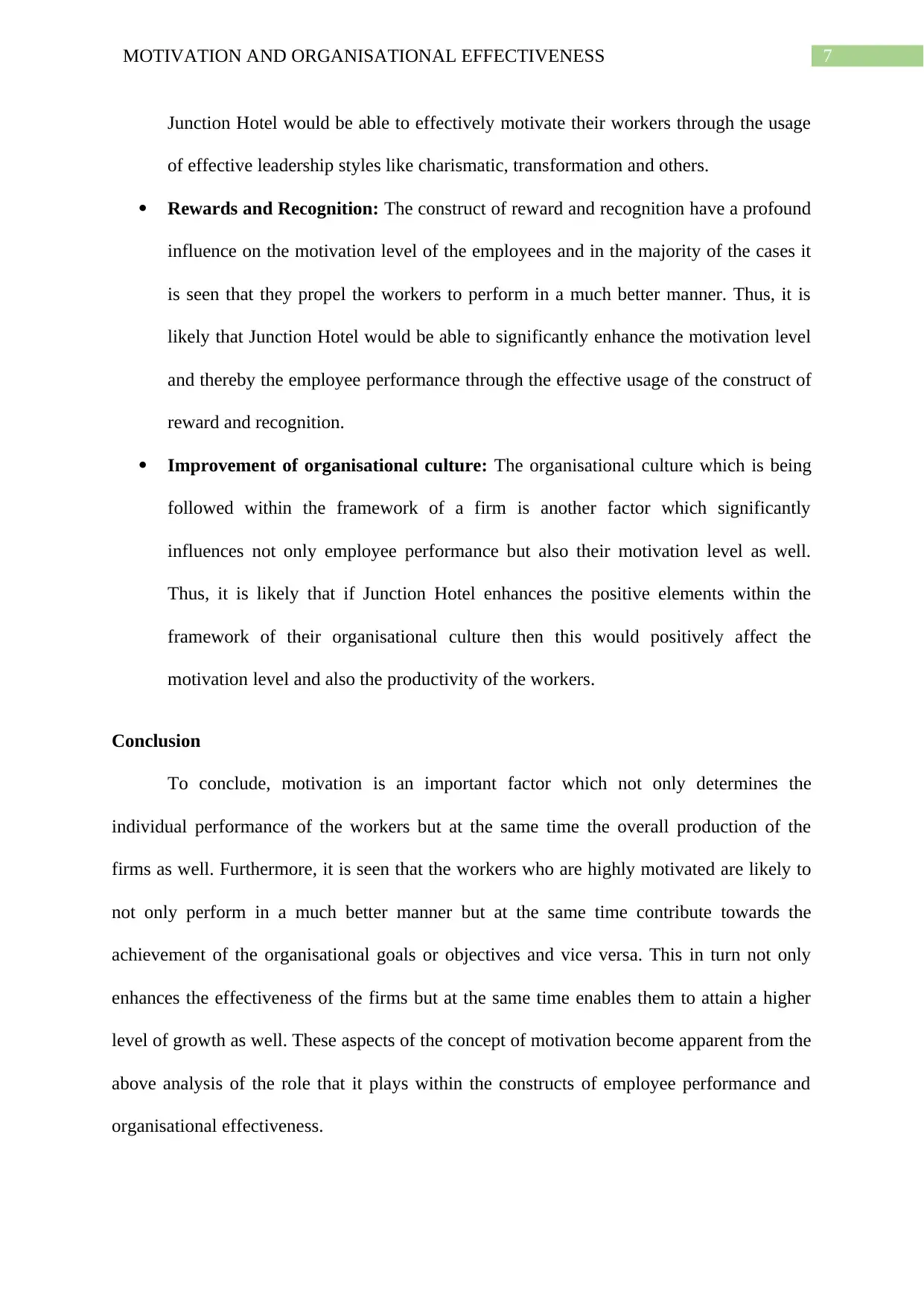
7MOTIVATION AND ORGANISATIONAL EFFECTIVENESS
Junction Hotel would be able to effectively motivate their workers through the usage
of effective leadership styles like charismatic, transformation and others.
Rewards and Recognition: The construct of reward and recognition have a profound
influence on the motivation level of the employees and in the majority of the cases it
is seen that they propel the workers to perform in a much better manner. Thus, it is
likely that Junction Hotel would be able to significantly enhance the motivation level
and thereby the employee performance through the effective usage of the construct of
reward and recognition.
Improvement of organisational culture: The organisational culture which is being
followed within the framework of a firm is another factor which significantly
influences not only employee performance but also their motivation level as well.
Thus, it is likely that if Junction Hotel enhances the positive elements within the
framework of their organisational culture then this would positively affect the
motivation level and also the productivity of the workers.
Conclusion
To conclude, motivation is an important factor which not only determines the
individual performance of the workers but at the same time the overall production of the
firms as well. Furthermore, it is seen that the workers who are highly motivated are likely to
not only perform in a much better manner but at the same time contribute towards the
achievement of the organisational goals or objectives and vice versa. This in turn not only
enhances the effectiveness of the firms but at the same time enables them to attain a higher
level of growth as well. These aspects of the concept of motivation become apparent from the
above analysis of the role that it plays within the constructs of employee performance and
organisational effectiveness.
Junction Hotel would be able to effectively motivate their workers through the usage
of effective leadership styles like charismatic, transformation and others.
Rewards and Recognition: The construct of reward and recognition have a profound
influence on the motivation level of the employees and in the majority of the cases it
is seen that they propel the workers to perform in a much better manner. Thus, it is
likely that Junction Hotel would be able to significantly enhance the motivation level
and thereby the employee performance through the effective usage of the construct of
reward and recognition.
Improvement of organisational culture: The organisational culture which is being
followed within the framework of a firm is another factor which significantly
influences not only employee performance but also their motivation level as well.
Thus, it is likely that if Junction Hotel enhances the positive elements within the
framework of their organisational culture then this would positively affect the
motivation level and also the productivity of the workers.
Conclusion
To conclude, motivation is an important factor which not only determines the
individual performance of the workers but at the same time the overall production of the
firms as well. Furthermore, it is seen that the workers who are highly motivated are likely to
not only perform in a much better manner but at the same time contribute towards the
achievement of the organisational goals or objectives and vice versa. This in turn not only
enhances the effectiveness of the firms but at the same time enables them to attain a higher
level of growth as well. These aspects of the concept of motivation become apparent from the
above analysis of the role that it plays within the constructs of employee performance and
organisational effectiveness.

8MOTIVATION AND ORGANISATIONAL EFFECTIVENESS
⊘ This is a preview!⊘
Do you want full access?
Subscribe today to unlock all pages.

Trusted by 1+ million students worldwide
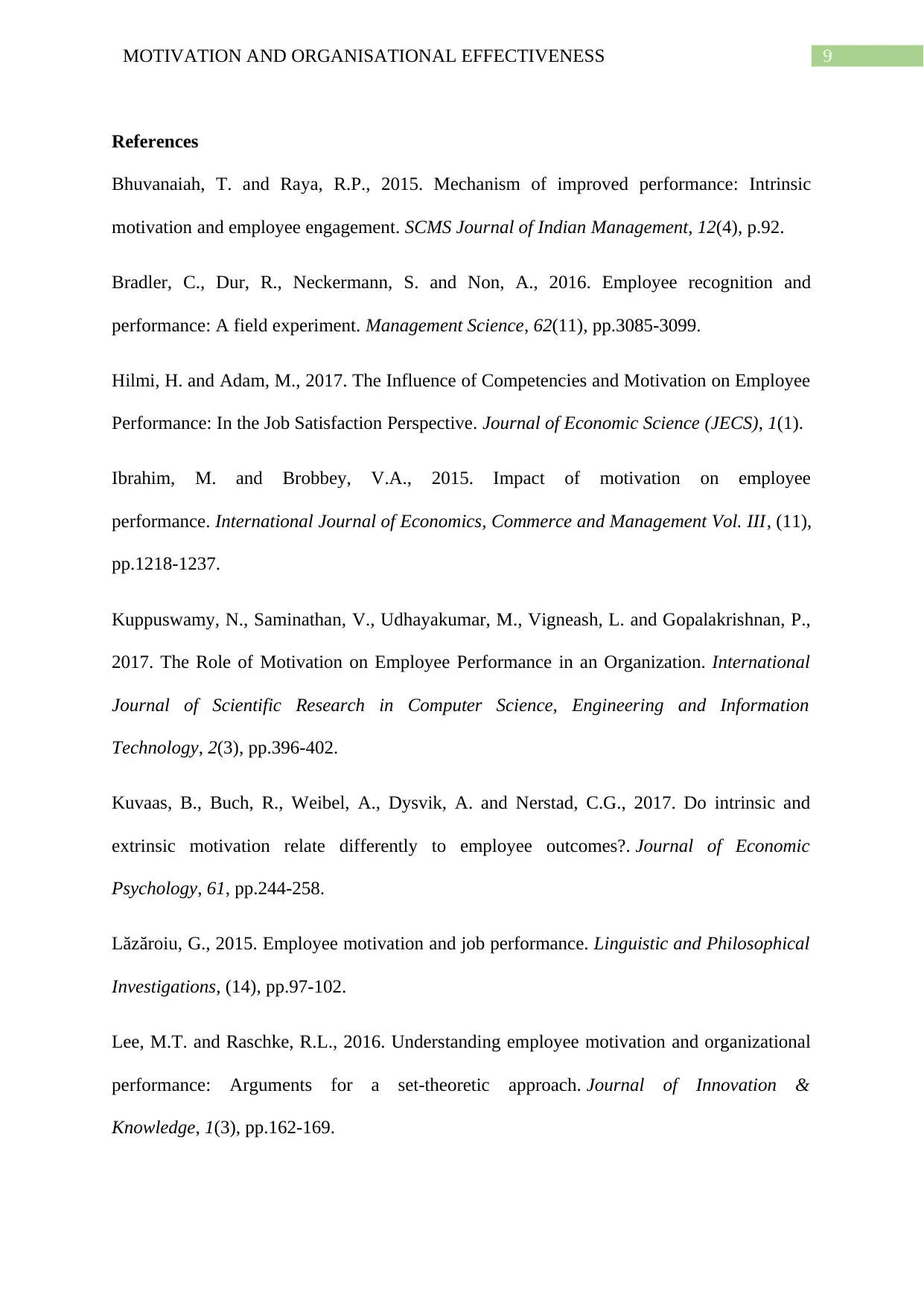
9MOTIVATION AND ORGANISATIONAL EFFECTIVENESS
References
Bhuvanaiah, T. and Raya, R.P., 2015. Mechanism of improved performance: Intrinsic
motivation and employee engagement. SCMS Journal of Indian Management, 12(4), p.92.
Bradler, C., Dur, R., Neckermann, S. and Non, A., 2016. Employee recognition and
performance: A field experiment. Management Science, 62(11), pp.3085-3099.
Hilmi, H. and Adam, M., 2017. The Influence of Competencies and Motivation on Employee
Performance: In the Job Satisfaction Perspective. Journal of Economic Science (JECS), 1(1).
Ibrahim, M. and Brobbey, V.A., 2015. Impact of motivation on employee
performance. International Journal of Economics, Commerce and Management Vol. III, (11),
pp.1218-1237.
Kuppuswamy, N., Saminathan, V., Udhayakumar, M., Vigneash, L. and Gopalakrishnan, P.,
2017. The Role of Motivation on Employee Performance in an Organization. International
Journal of Scientific Research in Computer Science, Engineering and Information
Technology, 2(3), pp.396-402.
Kuvaas, B., Buch, R., Weibel, A., Dysvik, A. and Nerstad, C.G., 2017. Do intrinsic and
extrinsic motivation relate differently to employee outcomes?. Journal of Economic
Psychology, 61, pp.244-258.
Lăzăroiu, G., 2015. Employee motivation and job performance. Linguistic and Philosophical
Investigations, (14), pp.97-102.
Lee, M.T. and Raschke, R.L., 2016. Understanding employee motivation and organizational
performance: Arguments for a set-theoretic approach. Journal of Innovation &
Knowledge, 1(3), pp.162-169.
References
Bhuvanaiah, T. and Raya, R.P., 2015. Mechanism of improved performance: Intrinsic
motivation and employee engagement. SCMS Journal of Indian Management, 12(4), p.92.
Bradler, C., Dur, R., Neckermann, S. and Non, A., 2016. Employee recognition and
performance: A field experiment. Management Science, 62(11), pp.3085-3099.
Hilmi, H. and Adam, M., 2017. The Influence of Competencies and Motivation on Employee
Performance: In the Job Satisfaction Perspective. Journal of Economic Science (JECS), 1(1).
Ibrahim, M. and Brobbey, V.A., 2015. Impact of motivation on employee
performance. International Journal of Economics, Commerce and Management Vol. III, (11),
pp.1218-1237.
Kuppuswamy, N., Saminathan, V., Udhayakumar, M., Vigneash, L. and Gopalakrishnan, P.,
2017. The Role of Motivation on Employee Performance in an Organization. International
Journal of Scientific Research in Computer Science, Engineering and Information
Technology, 2(3), pp.396-402.
Kuvaas, B., Buch, R., Weibel, A., Dysvik, A. and Nerstad, C.G., 2017. Do intrinsic and
extrinsic motivation relate differently to employee outcomes?. Journal of Economic
Psychology, 61, pp.244-258.
Lăzăroiu, G., 2015. Employee motivation and job performance. Linguistic and Philosophical
Investigations, (14), pp.97-102.
Lee, M.T. and Raschke, R.L., 2016. Understanding employee motivation and organizational
performance: Arguments for a set-theoretic approach. Journal of Innovation &
Knowledge, 1(3), pp.162-169.
Paraphrase This Document
Need a fresh take? Get an instant paraphrase of this document with our AI Paraphraser
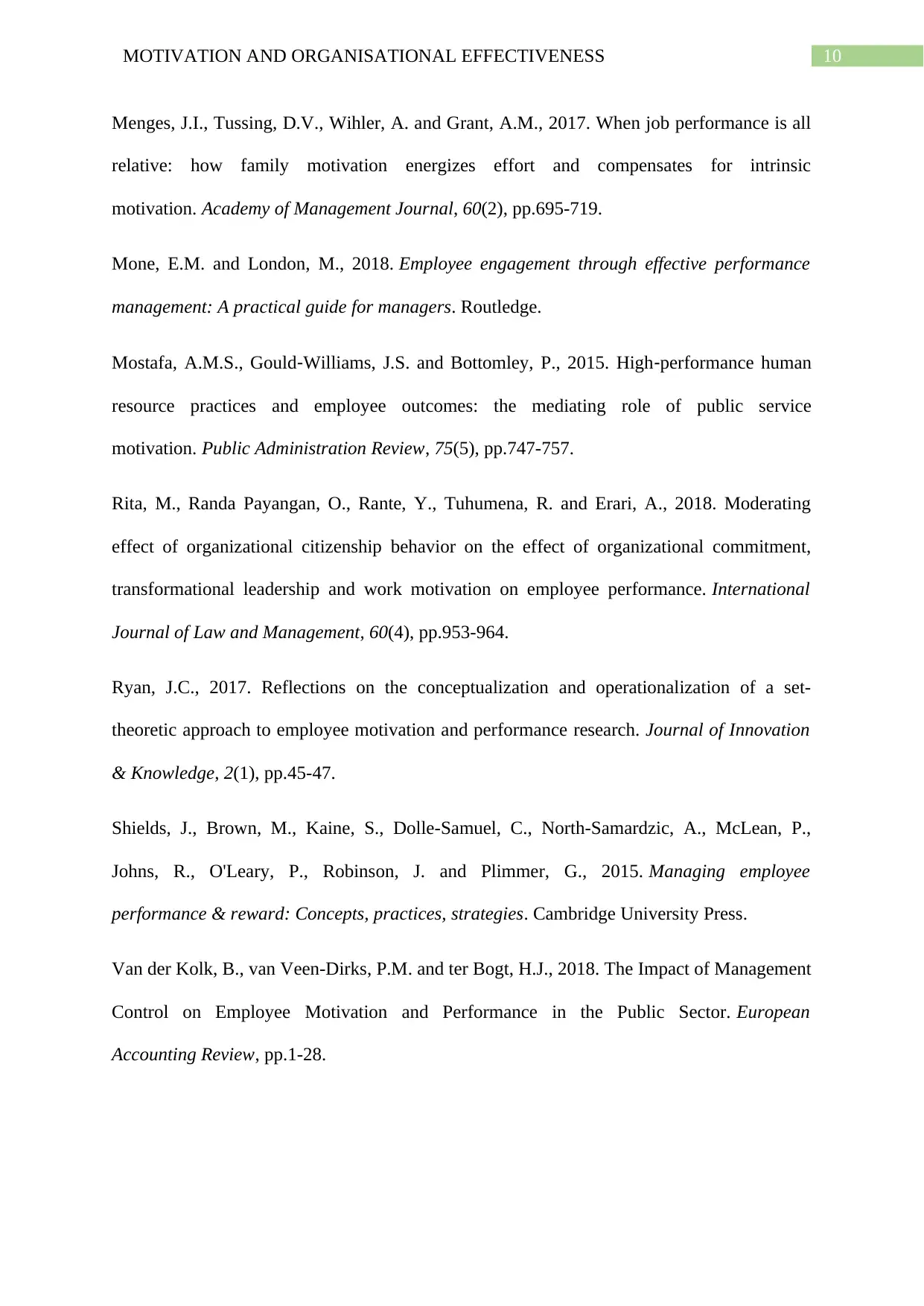
10MOTIVATION AND ORGANISATIONAL EFFECTIVENESS
Menges, J.I., Tussing, D.V., Wihler, A. and Grant, A.M., 2017. When job performance is all
relative: how family motivation energizes effort and compensates for intrinsic
motivation. Academy of Management Journal, 60(2), pp.695-719.
Mone, E.M. and London, M., 2018. Employee engagement through effective performance
management: A practical guide for managers. Routledge.
Mostafa, A.M.S., Gould‐Williams, J.S. and Bottomley, P., 2015. High‐performance human
resource practices and employee outcomes: the mediating role of public service
motivation. Public Administration Review, 75(5), pp.747-757.
Rita, M., Randa Payangan, O., Rante, Y., Tuhumena, R. and Erari, A., 2018. Moderating
effect of organizational citizenship behavior on the effect of organizational commitment,
transformational leadership and work motivation on employee performance. International
Journal of Law and Management, 60(4), pp.953-964.
Ryan, J.C., 2017. Reflections on the conceptualization and operationalization of a set-
theoretic approach to employee motivation and performance research. Journal of Innovation
& Knowledge, 2(1), pp.45-47.
Shields, J., Brown, M., Kaine, S., Dolle-Samuel, C., North-Samardzic, A., McLean, P.,
Johns, R., O'Leary, P., Robinson, J. and Plimmer, G., 2015. Managing employee
performance & reward: Concepts, practices, strategies. Cambridge University Press.
Van der Kolk, B., van Veen-Dirks, P.M. and ter Bogt, H.J., 2018. The Impact of Management
Control on Employee Motivation and Performance in the Public Sector. European
Accounting Review, pp.1-28.
Menges, J.I., Tussing, D.V., Wihler, A. and Grant, A.M., 2017. When job performance is all
relative: how family motivation energizes effort and compensates for intrinsic
motivation. Academy of Management Journal, 60(2), pp.695-719.
Mone, E.M. and London, M., 2018. Employee engagement through effective performance
management: A practical guide for managers. Routledge.
Mostafa, A.M.S., Gould‐Williams, J.S. and Bottomley, P., 2015. High‐performance human
resource practices and employee outcomes: the mediating role of public service
motivation. Public Administration Review, 75(5), pp.747-757.
Rita, M., Randa Payangan, O., Rante, Y., Tuhumena, R. and Erari, A., 2018. Moderating
effect of organizational citizenship behavior on the effect of organizational commitment,
transformational leadership and work motivation on employee performance. International
Journal of Law and Management, 60(4), pp.953-964.
Ryan, J.C., 2017. Reflections on the conceptualization and operationalization of a set-
theoretic approach to employee motivation and performance research. Journal of Innovation
& Knowledge, 2(1), pp.45-47.
Shields, J., Brown, M., Kaine, S., Dolle-Samuel, C., North-Samardzic, A., McLean, P.,
Johns, R., O'Leary, P., Robinson, J. and Plimmer, G., 2015. Managing employee
performance & reward: Concepts, practices, strategies. Cambridge University Press.
Van der Kolk, B., van Veen-Dirks, P.M. and ter Bogt, H.J., 2018. The Impact of Management
Control on Employee Motivation and Performance in the Public Sector. European
Accounting Review, pp.1-28.
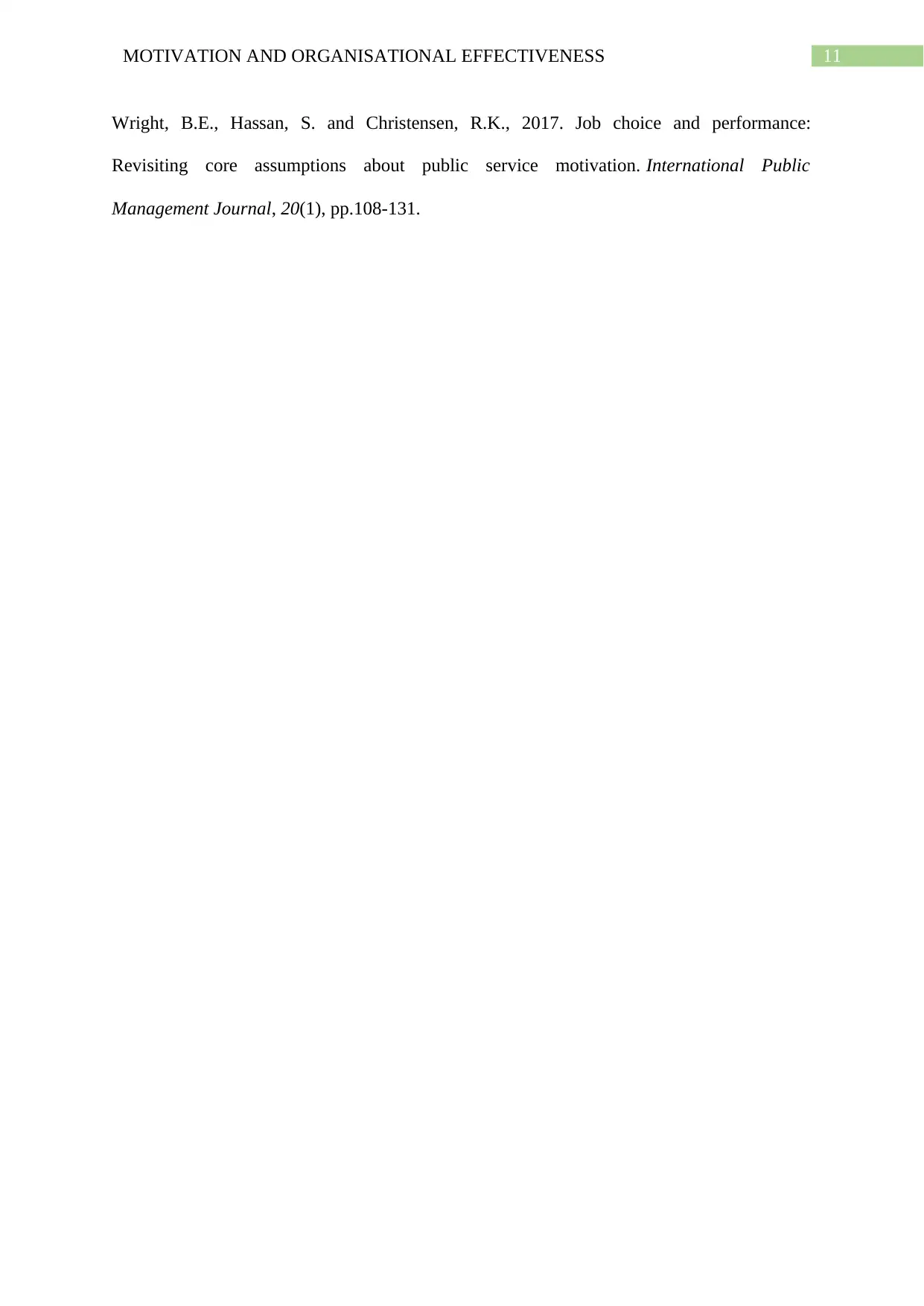
11MOTIVATION AND ORGANISATIONAL EFFECTIVENESS
Wright, B.E., Hassan, S. and Christensen, R.K., 2017. Job choice and performance:
Revisiting core assumptions about public service motivation. International Public
Management Journal, 20(1), pp.108-131.
Wright, B.E., Hassan, S. and Christensen, R.K., 2017. Job choice and performance:
Revisiting core assumptions about public service motivation. International Public
Management Journal, 20(1), pp.108-131.
⊘ This is a preview!⊘
Do you want full access?
Subscribe today to unlock all pages.

Trusted by 1+ million students worldwide
1 out of 12
Related Documents
Your All-in-One AI-Powered Toolkit for Academic Success.
+13062052269
info@desklib.com
Available 24*7 on WhatsApp / Email
![[object Object]](/_next/static/media/star-bottom.7253800d.svg)
Unlock your academic potential
Copyright © 2020–2025 A2Z Services. All Rights Reserved. Developed and managed by ZUCOL.





